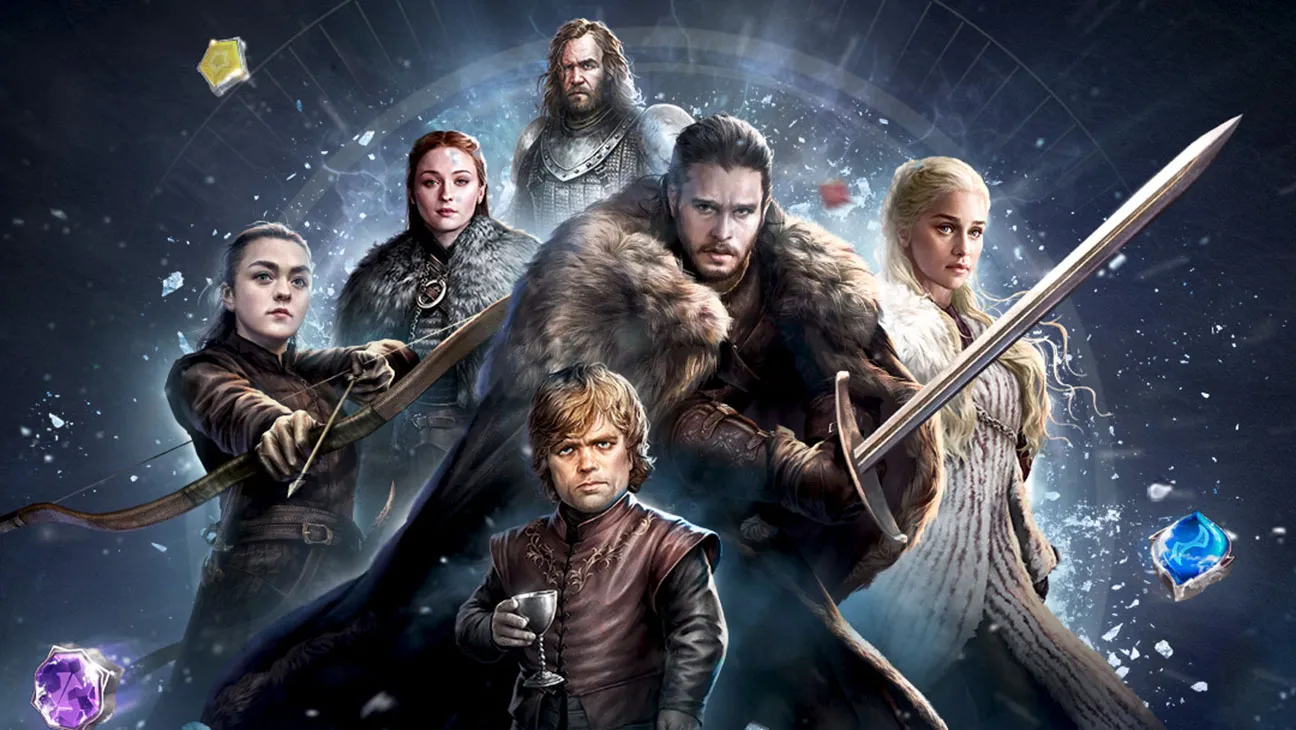Game of Thrones Review

Game of Thrones Review: HBO’s epic fantasy series, Game of Thrones, captivated audiences for seven seasons with its sprawling narrative, complex characters, and ruthless depiction of a power struggle for the Iron Throne of Westeros. Based on George R.R. Martin’s fantasy novels, A Song of Ice and Fire, the series became a cultural phenomenon, sparking passionate discussions, fan theories, and water cooler conversations. This review delves into the show’s strengths, examines its narrative choices, and analyzes its lasting impact on the fantasy television genre.

A World of Intrigue and Danger: Westeros and Beyond
Game of Thrones takes viewers on a journey across the vast continent of Westeros, a land filled with noble houses vying for control. From the scheming Lannisters of King’s Landing to the honorable Starks of Winterfell, each house possesses its own history, traditions, and ambitions. The series also ventures beyond the Wall, a massive fortification guarding against the mythical Wildlings and the even more terrifying threat – the White Walkers, an ancient race of ice creatures. This expansive world, meticulously crafted by Martin and translated to the screen with stunning visuals, is a key element of the show’s success.
A Game of Thrones: Power Struggles and Shifting Alliances
The central narrative revolves around the power struggle for the Iron Throne. With the death of the previous king, noble houses engage in a brutal war marked by betrayal, assassination, and political maneuvering. The series masterfully depicts the complexity of these conflicts, showcasing how alliances shift, loyalties are tested, and morals are compromised in the pursuit of power. This constant sense of intrigue and danger keeps viewers on the edge of their seats, never knowing who to trust and which character might meet a shocking and unexpected demise.
Beyond Battles and Dragons: A Rich Cast of Characters
Game of Thrones boasts a sprawling cast of characters, each with their own motivations, desires, and flaws. We witness the rise of Daenerys Targaryen, the exiled heir to the Iron Throne, from a powerless young woman to a powerful conqueror with dragons at her command. On the other side of the spectrum, Tyrion Lannister, a witty and sardonic dwarf, navigates a treacherous court despite his intelligence and cunning. The series excels at portraying the characters’ complexities, allowing even villains to display moments of vulnerability or unexpected humanity. This depth of characterization allows viewers to connect with the narrative on an emotional level, feeling invested in the characters’ fates.
A Grimdark Fantasy: Breaking Genre Conventions
Unlike traditional fantasy narratives with clear-cut heroes and villains, Game of Thrones embraces a “grimdark” approach. Good characters face brutal deaths, while villains often escape punishment. The series doesn’t shy away from portraying the harsh realities of war, political corruption, and sexual violence. This departure from conventional fantasy tropes challenged viewers’ expectations and contributed to the show’s immense popularity.
The Price of Power: Exploring Morality and Consequences
Throughout its run, Game of Thrones raises questions about the true cost of power. Does one need to become ruthless and manipulative to achieve their goals? What sacrifices are justified in the pursuit of a crown? The series explores these complex moral dilemmas, prompting viewers to debate the actions of various characters. By refusing to present easy answers, Game of Thrones offers a thought-provoking exploration of power, ambition, and the human condition.
The Show Must Go On: Adapting Epic Source Material
Adapting a sprawling fantasy series like A Song of Ice and Fire presented a significant challenge for the showrunners. While the first few seasons meticulously followed the books’ plotlines, later seasons diverged, introducing new plot points and altering character arcs. These deviations sparked debate among fans, with some praising the show’s creative license and others lamenting the departures from the source material.
A Legacy of Spectacle and Controversy
Despite its critical acclaim and cultural impact, Game of Thrones’ final season was met with mixed reactions. Some viewers felt the character arcs were rushed and the ending unsatisfying. However, the show’s legacy remains undeniable. It revolutionized epic fantasy television with its breathtaking visuals, intricate world-building, and willingness to depict violence and complex moral themes.
A Genre-Defining Legacy
Game of Thrones paved the way for a new era of fantasy television. It demonstrated that fantasy could go beyond simple tales of good versus evil, offering complex narratives with mature themes and characters with depth and flaws. The show’s influence can be seen in numerous fantasy series that followed, striving to capture the same level of epic storytelling and intricate world-building.
Building upon the groundwork laid in the previous section, let’s delve deeper into the captivating world of Game of Thrones. Here, we’ll explore the show’s thematic exploration of power dynamics, analyze the portrayal of women in a patriarchal society, and consider the series’ impact on social discourse.
The Many Faces of Power: From Brute Force to Political Savvy
Game of Thrones showcases the multifaceted nature of power. We see characters like Robert Baratheon, who wields power through brute force and charisma, struggle to maintain control in times of peace. Meanwhile, characters like Petyr Baelish, often underestimated due to his stature, manipulate others through cunning strategies and whispered secrets. The series explores the power dynamics within families, the influence of wealth and resources, and the psychological manipulation used to maintain control.
Beyond the Throne: Examining Gender Roles and Representation
Westeros is a patriarchal society, and Game of Thrones doesn’t shy away from portraying the limitations placed upon women. However, the show also offers glimpses of female empowerment. Cersei Lannister defies societal expectations, clawing her way to influence and exploiting the patriarchal system to her advantage. Daenerys Targaryen breaks free from her sheltered upbringing, becoming a powerful leader who challenges traditional gender roles. While the portrayal of violence against women is a source of criticism, the series also sparks important conversations about gender equality and female agency within a restrictive social structure.
Beyond Black and White: Morality in a Time of War
Game of Thrones refuses to present clear-cut heroes and villains. Characters like Jon Snow are forced to make difficult choices, blurring the lines between right and wrong. The series explores the complex moral dilemmas faced during wartime, where survival often hinges on ruthless tactics. This ambiguity prompts viewers to engage with the narrative on an intellectual level, questioning their own moral compass and debating the characters’ actions.
Beyond Westeros: Exploring Social Commentary
While set in a fantasy realm, Game of Thrones reflects real-world issues. The series draws parallels between the political machinations of Westeros and historical power struggles. Themes of religious fanaticism, environmental destruction, and the cyclical nature of violence are explored throughout the narrative. By prompting viewers to consider these themes within the context of a fantastical world, the show encourages broader discussions about social and political issues.
A Feast for the Senses: Visual Storytelling and World-Building
Game of Thrones is a masterclass in visual storytelling. From the imposing walls of King’s Landing to the desolate beauty of the Wall, the series meticulously crafts a believable and visually stunning world. The show’s costume design reflects the social hierarchy and cultural nuances of each region. The use of CGI to depict dragons and other fantastical creatures adds an element of wonder to the narrative. This commitment to creating a visually immersive world is a key factor in the show’s enduring appeal.
A Legacy of Fan Theories and Speculation
Game of Thrones fostered a passionate and engaged fanbase. The show’s complex narrative and reliance on foreshadowing led to a vibrant online community where fans debated theories, analyzed character motivations, and predicted future plot twists. This level of audience engagement, fueled by the show’s intricate storytelling, is another element that contributed to its cultural phenomenon status.
A Continuing Conversation: The Show’s Impact on Fantasy
Game of Thrones’ influence on fantasy television is undeniable. It paved the way for a new generation of fantasy series that are darker, more complex, and willing to explore mature themes. The show also inspired a renewed interest in the fantasy genre as a whole, attracting new audiences who might not have previously been drawn to such narratives.
A World Beyond the Screen: The Future of Westeros
While the television series has concluded, the world of Westeros continues to grow. Prequel series like “House of the Dragon” delve deeper into the Targaryen dynasty and the events leading up to the events of Game of Thrones. This continued exploration of the world and its characters ensures that Westeros remains a captivating and ever-expanding universe.
A Song of Ice and Fire Endures: A Final Word
Game of Thrones is a landmark achievement in television history. Its captivating narrative, complex characters, and willingness to embrace dark themes and moral ambiguity resonated with audiences worldwide. The series continues to inspire conversation, debate, and fan theories even after its conclusion. As long as viewers remain fascinated by the intricate world of Westeros and its enduring struggles for power, the Song of Ice and Fire will continue to echo.

Leave a Comment